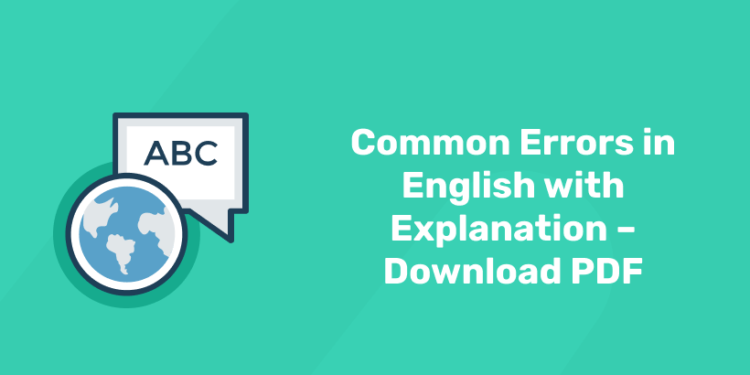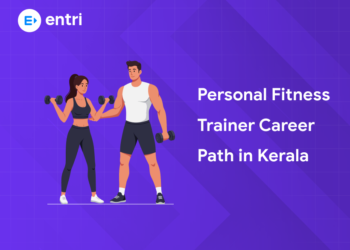Table of Contents
“To Err is Human, To Forgive is Divine” – Alexander Pope
To Err is Human, and no human is perfect. Mistakes are part of human existence. It’s natural to commit errors. But mending the errors and moving on takes courage and determination. Are you ready to mend your mistakes?
The English language lacks a central body of regulation. English is a universally accepted language and has the highest number of native speakers. The use of the English language by non-native speakers often finds its pitfalls. While learning a language, avoid making conscious mistakes. There are umpteen rules that you should follow while learning a language flawlessly. Each language has its intricacies. The things that you could readily express in your mother tongue may be difficult to communicate in English. The translation of your mother tongue into English can not rectify your mistakes. Now, it’s time for us to tackle the most common errors English language learners make while learning the language.
It’s time for us to mend and move on!
How to Handle Language Effectively?
How to effectively handle the English language? Here are the tips that can help you to use English language like a pro. The first and foremost thing that you can do is worry less about accuracy. The learners should shift their attention from accuracy to precise communication. The learners ought to focus less on the mistakes that they are making and focus more on communicating their message. Build self-confidence and change the way that you think and perceive yourself. Enthusiastic learners should feel confident that they will fix the mistakes they make over time as they need to start exposing themselves to English in real situations. Exposure to language can help learners to overcome language barriers.
The learners can effectively focus on the language that they need to use in everyday life. They can think broadly about English as a spoken and written language. As per the statistics, an average native English speaker actively uses around ten to twelve percent of English words. If a learner is good enough to grasp at least ten percent of English words, they will be as good as a native English speaker. The learners should pay more attention to the useful parts of the language instead of getting overwhelmed by the confusion created by the language. The learners should have a specific idea about how to use the English language that can help them to become fluent in their area of expertise and their career. Finding people with the same interests and helping each other to communicate and excel in your area of expertise is a part of you slowly becoming a successful learner. Surround yourself with English to learn English in a much better way.
Role play can help you secure your language proficiency. The learners should find a guide and mentor to work with them while helping them to practice role plays. Act as if you are stuck in a particular situation and handle language that can help you in that situation. Practice can only make you perfect. You can practice until you become fluent and proficient in that area of choice. This strategy can help you to expertise in a particular area and could act as a very useful tool to improve your mastery over language.
Elevate your english speaking skills ! join now !!
1: Which of the sentences below is grammatically correct?
Spoken English Course for Guaranteed Confidence and Career Growth
Spoken English Course by Entri App: Enhance your communication skills, gain certification, and boost your career with confidence.
Join Now!15 Common Errors in English
Correct some common mistakes that we make while handling the English language so that you can advance in your career.
1. SAY Vs TELL
One of the most common mistakes is the difference between Say and Tell. People often get confused about where to use say and tell. It sounds bad when you use it incorrectly.
Say- “ Say” is used when someone says something. If not mentioning anyone else you can use ” say”
Tell- If someone says that same thing to someone else, we use the verb “to tell”.
Example
- She said that she wants to go to the theatre
- She told me that she wants to go to the theatre
- I told my friend let’s go to college.
- She said goodbye!
- I will tell you a secret!
Phrases with Tell
You cannot use ‘say’ with certain sentences, for instance,
- tell (someone) a story
- Tell (someone) a lie
- Tell (someone ) the truth
- Tell the future( to know what the future will bring)
- Tell the time ( know how to read a clock)
- Tell a secret!
Speak confidently and fluently with our Spoken English Course!
2. THEIR, THERE OR THEY’RE
Their- ‘Their’ is a possessive pronoun. It signifies ownership of something by one or more people.
Example
- I visited my grandparents over the weekend. Their house is beautiful.
- Their car is expensive
- Their pets are scary
They’re- “They’re” is a contraction of “they are”
Example
- My friends didn’t bring umbrellas. They’re going to get wet
- They’re getting married.
- They’re getting ready
There- “There” can be used as an adverb, noun, pronoun, or adjective. However, it is NOT a possessive pronoun or a contraction.
Example
- I traveled there during my vacation. (adverb)
- I will always be there for you. (adjective)
- We can go there. (noun)
- There is someone at the door. (pronoun)
3. IT’S Vs ITS
It’s- “It’s” is a contraction of ” it is”. People often get confused because an apostrophe combined with the letter “s” is usually associated with the possession of something.
Example
- Have you read this book? It’s one of my favorites.
- It’s almost six o’clock.
- It’s about the quality
Its- “Its” is a possessive pronoun that signifies ownership by a non-human thing.
Example
- Look at that tree! Its leaves are so beautiful!
- The cat licked its tail.
- This basket is new Its patterns are unique
4. YOUR Vs YOU’RE
Your- “Your” indicates a possession, that something belongs to you.
Example
- Can I use your pencil?
- Can I read your book?
- Is this your lunch box?
You’re- “You’re” is the contraction of the words “You and are”.
Example
- You’re beautiful.
- You’re not listening to me.
- Do you know where you’re going?
Join our Spoken English program today and communicate with ease!
5. MEET Vs SEE
Meet – “Meet” is only used for people that you meet for the first time.
Example: What’s your name? Nice to meet you.
See- “See” is used when talking to people you already know.
Example
- It’s nice to see you.
- It’s nice to see you again.
|
Download free PDFs on various aspects of the English language! |
|
6. COMPARATIVES (THAN)
When using the word “than” while comparing two things, you need to say how they compare.
Example
- Bigger than
- Smaller than
- Sweeter than
- Taller than
- Shorter than
- Spicer than
OR
- Less productive than
- More productive than
“She is tall than her” is a wrong sentence. You need to switch to “she is taller than her”. Use the “-er” form or the comparative form to make comparisons.
The second major mistake that people usually commit while dealing with the English language is the use of more/most with the ‘er’ and ‘est’ words. To make you sound more authentic and proficient, don’t use “more/most” along with “er and est” words.
Example:
- The apple is sweeter than the tomatoes
- The apple is More sweeter than the tomatoes.
Let’s look at another sentence, “I want a better life” which is an example of the correct usage of a sentence which shows your yearning to live a life in a better way. The sentence ” I want a more better life” is wrong in all its sense as the word ” ‘more’ is not suitable to go along with ‘better’.
7. WRONG USE OF MYSELF AND AM
While you introduce yourself, don’t use sentences like “Myself(name)” or “Am (name)” to introduce yourself to someone. Instead, say ” I am (name)” or “My name is (name)”.
Example
- I am Harsha
- My name is Diya
8. PROPER USE OF THE ‘Y’ SOUND
Sometimes, you tend to add ‘y’ in front of English words starting with ‘e’.
To make it more clear, here is a demonstration of how people often tend to add ‘y’ in front of certain words starting with ‘e’
Example
- It’s not Yegg but egg
- It’s not Yelephant but an elephant
- It’s not Yempire but an empire.
Also, you may tend to remove the ‘Y’ sound from certain words that start with ‘Ye’.
Example
- It’s Yellow and not Ellow
- It’s Yes and not Es
- It’s ‘yearn’ and not Eearn
9. UNCOUNTABLE NOUNS
Uncountable nouns do not have plural forms and they cannot be used with numbers or article a/an.
Example
- Advice
- Information
- Luggage
- Furniture
- Research
- Work
- Content
- Failure
- Motivation
- Pollution
- Youth
Master pronunciation and fluency with our Spoken English classes.
10. NOUNS WITH IDENTICAL SINGULAR AND PLURAL FORMS
There are many nouns in the English language whose plural is not formed by “-s or -es”. The learners should note the fact that there are many words in the English language that do not change to form the plural.
Some everyday life examples are given below for a better understanding
- Deer
- Aircraft
- Fish
- Sheep
- Shrimp
- Moose
- News
Also, note that the adjectives used to describe a nation or cultural group can be used as plural nouns only.
Example: British, French, German, Italian, etc.
Speak confidently and fluently with our Spoken English Course!
11. EVERY WITH SINGULAR NOUN/PLURAL NOUN
“Every” is used as a determiner. ‘Every’ is used to denote each member of a group. Never use ‘every’ with a plural noun. As per the rule, “every” should be used along with the singular noun to refer to all the members of a group. Learners should also note that whenever ‘every’ is used as a reference to the subject of a clause, you have to use a singular verb.
Example
- Every player wants to be noticed.
- Every student needs a good lecturer.
- Every student is smart in the class
Note that, a singular noun is always used with every. This is a very common mistake that we commit in our everyday language use.
12. DISINTERESTED Vs UNINTERESTED
People often get confused with the words disinterested and uninterested. Both words are seemingly similar but carry altogether different meanings. They are often used as if they have the same meaning. To avoid confusion, you need to know the difference between both.
When someone doesn’t show any vested interest in any matter, such a person is disinterested. It can also suggest being impartial, not influenced by the deliberation of personal gains. ” Uninterested on the other hand shows a lack of interest in something.
Example
- He is uninterested in Biology.
- Many students are uninterested in swimming.
- The judge is disinterested in the case.
- She seemed disinterested in what was going on at home
13. FALL Vs FALL DOWN
We often get confused between ” fall and fall down”. Fall can be used as a noun or a verb. Whereas “fall down” is a phrasal verb.
To “fall down” means to ” fall into the ground from standing position”. To “fall” means to “come down from a much higher position”.
Tears do not ‘fall down’ from your eyes but they just fall from your eyes. Leaves, rain, snow, apple, etc do not fall down but fall. As per the prescribed rule, you should use ‘fall’ and not ‘fall down’ to show the natural downward movement of many things.
Example
- Ten trees fell in the storm
- Elizabeth had a terrible fall yesterday.
- The picture keeps falling down
- Rent has fallen down.
14. JEWELLERY Vs JEWELLERS
The words like jewellery and jewellers are often wrongly understood by people. The word ” jewellery” denotes the ornaments like bangles, necklaces, rings, chains, etc. This word is often taken for granted as a word that denotes the place where ornaments are sold. Please keep in mind that you buy your jewellery from a jeweller’s. The jeweller is the word used to denote the place where ornaments are sold to customers. There are different types of jewellery, for instance, expensive-looking jewellery made of inexpensive materials is known as “costume jewellery whereas “rolled gold” is gold plated.
15. EACH OTHER Vs ONE ANOTHER
People often wrongly understood the meaning of both these words.
One another is more formal when compared to each other. We use “each other’ while talking about only two people. Whereas “one another” can be used when we mention about three or more people.
Example
- They both love each other.
- Her team members trust one another
- Miya and Rohan hate each other
- We have to help one another.
Elevate your speaking skills with our Spoken English Course!
An enthusiastic learner should seek proper resources and guidance to learn better. If you’re a person who struggles with language barriers, English Padikkyam with Inverted Coconut is the best choice for you. Aparna Mulberry, an American Professional English Trainer, helps you to learn the basics of English, grammar, spoken English, pronunciation, and a lot more. The course is designed systematically and holistically particularly aiming at beginners who are just getting started with English language learning. Proper guidance and practice can enrich your command of the language. Tracking down your learning process and improving your vocabulary are added benefits of the course. Learn English Padikkyam with Inverted Coconut to reinvent yourself. Make the English language learning a new definition for your renewed self!
Happy Learning!











